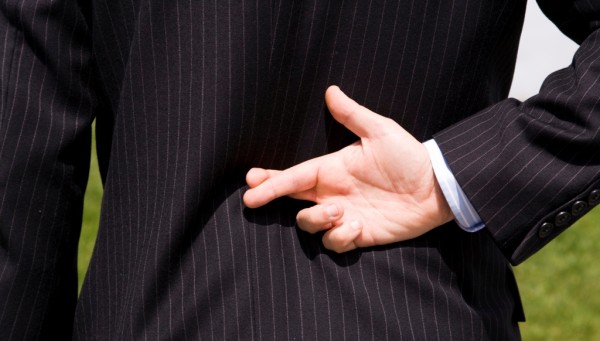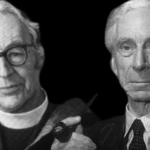Interfering with the Eschaton: Why Lying Is Wrong
by Leah Libresco
Filed under Morality
EDITOR'S NOTE: This is the third of a three-part series on the morality of lying. Our first post came Tuesday from Deacon Jim Russell. Yesterday we hard from Patheos atheist blogger James Croft. Today we hear from Catholic blogger Leah Libresco.
"If I speak with the tongues of men and of angels, but do not have love, I have become a noisy gong or a clanging cymbal." – 1 Cor 13:1
In his essay on the ethics of lying, James Croft correctly says he worries when humans aren’t unsettled by their moral laws. We are imperfect, so we should expect to jostle against ethical injunctions, either because we struggle to live them out, or because our limited vision has caused us to formulate them clumsily.
So when we run into a dilemma like “Nazis at the door, Jews in the attic” or the more quotidian “friend prompted me to give an unflattering opinion” it’s an opportunity to examine our moral assumptions. Croft concludes that truth-telling is good insofar as it promotes the common good. So, honesty may be correct most of the time, but we shouldn’t be rigidly committed to that ideal, lest we become blind to the harm we may do to the people we’re speaking to.
Lying to save a life is a bit like concussing the Gestapo officer at the door. It’s a solution, and it may be the best of a set of bad options, but there’s a wound involved. A sin is a sin, even if the outcome was, on net, good from a consequentialist perspective. You still breached a duty or ruptured the relationship you ought to have with the officer at the door. The fact that you’re lying is a cue that something has gone wrong, whether upstream of your present moment in time or in this instant.
The strict Catholic edict against lying also springs from an awareness of our audience as people, moral agents, or adopted children of God (however you’d like to phrase it). Deceiving is choosing to make it hard for your target to understand the world around them. You’re introducing noise and bias into their signal, interfering with their ability to perceive and respond to the world and people around them.
I like to think of lying (actively or passively) as a special case of a general problem. In her Young Wizards series, Diane Duane would call it being pro-entropy. I might call it interfering with the eschaton. The telos of humanity is to be healed of all divisions. The wounds we have inflicted on ourselves or on others will be closed up, and it will be possible to be wholly united with each other and with God. Lying to someone is creating distance between my target and the world-as-it-is. And I’m deepening the distance between myself and the person I am instrumentalizing.
So whether it’s by omission or commission, deception is a stumbling block. When we’re tempted to lead others astray, we should be suspicious of our own motives. And if it truly seems necessary, we should wonder whether we can fix the problem at the source. How did we end up so out of joint with our neighbor and is there anything we can do to diminish the distance between us? If you are lying to protect someone (from themselves or an external threat) can you also help make them stronger or address the danger?
Honesty is a starting point; you can take the duty to avoid passive deception much further. Humans are prone to any number of biases that make it hard to hear or notice the truth. You may be telling the truth when you use CAPS LOCK, but you’ve made it harder for your interlocutor to listen to you. Tone can be as effective a barrier to truth as misdirection. Chemist Linus Pauling suggested we need to do things that feel like overcompensation, in order to be effective. He wrote, “Do unto others 20% better than you would expect them to do unto you, to correct for subjective error.”
Love begins by not placing any new obstacles in the way of our neighbors. And then we can go on to ask for help with the accidental and natural sources of confusion we encounter in our pursuit of truth.
Related Posts
Note: Our goal is to cultivate serious and respectful dialogue. While it's OK to disagree—even encouraged!—any snarky, offensive, or off-topic comments will be deleted. Before commenting please read the Commenting Rules and Tips. If you're having trouble commenting, read the Commenting Instructions.













